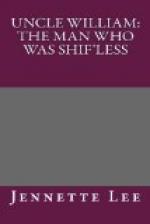The young man looked at the bottle. “You haven’t many left?”
“Eight more,” said Uncle William, rapping the cork into place. “That ’lows for one more fever for me afore I die—I don’t cal’ate to have but one more.” He looked about for his hat. “I’m goin’ out a little while,” he said, settling it on his head.
“Wait a minute, Uncle William.” The young man stretched out his hand. “How did you come to know I needed you?”
Uncle William took the hand in his, patting it slowly. “Why, that was nateral enough,” he said. “When Sergia wrote me, sayin’ you was sick—”
“Sergia wrote you?” the young man had turned away his eyes. “She should not have done it. She had no right—”
“Why not?” said Uncle William. He seated himself by the bed. There was something keen in the glance of his blue eyes. “You’re goin’ to be married, ain’t you?”
The head on the pillow turned uneasily. “No—not now.”
“Why not?”
“I shall never be able to take care of her.”
“Shucks!” said Uncle William. “Let her take care of you, then.”
The tears of weakness came into the young man’s eyes.
Uncle William’s gaze was fixed on space. “You’ve been foolish,” he said—“turrible foolish. I don’t doubt she wants to marry you this minute.”
“She shall not do it.” He spoke almost fiercely.
“There, there,” said Uncle William, soothingly, “I wouldn’t make such a fuss about it. Nobody’s goin’ to marry you ’thout you want ’em to. You jest quiet down and go to sleep. We’ll talk it over when I come back.”
XI
When he returned the artist was awake. His eyes had a clearer look.
Uncle William surveyed them over the top of his parcels. “Feelin’ better?” he said.
“Yes.”
He carried the parcels into the next room, and the artist heard him pottering around and humming. He came out presently in his shirt-sleeves. His spectacles were mounted on the gray tufts. “I’ve got a chowder going’,” he said. “You take another pill and then you’ll be about ready to eat some of it, when it’s done.”
“Can I eat chowder?” The tone was dubious, but meek.
“You’ve got all your teeth, hain’t you?”
“Yes.”
“Well, then, I guess you can eat it.”
“I haven’t been eating much.”
“I shouldn’t think you had.” Uncle William spoke dryly. “You needn’t be a mite afraid o’ one o’ my chowders. A baby could eat ’em, if it had got its teeth.”
The artist ate the chowder, when it came, and called for more, but Uncle William refused him sternly. “You jest wait awhile,” he said, bearing away the empty plate. “There ain’t more’n enough for a comfortable dish for me. You don’t want to eat it all, do you?”
“No,” said the artist, flushing.
“I thought not.” It took Uncle William a long time to eat his portion, and the artist fell asleep again, watching the rhythmic motion of the great jaw as it went slowly back and forth.




